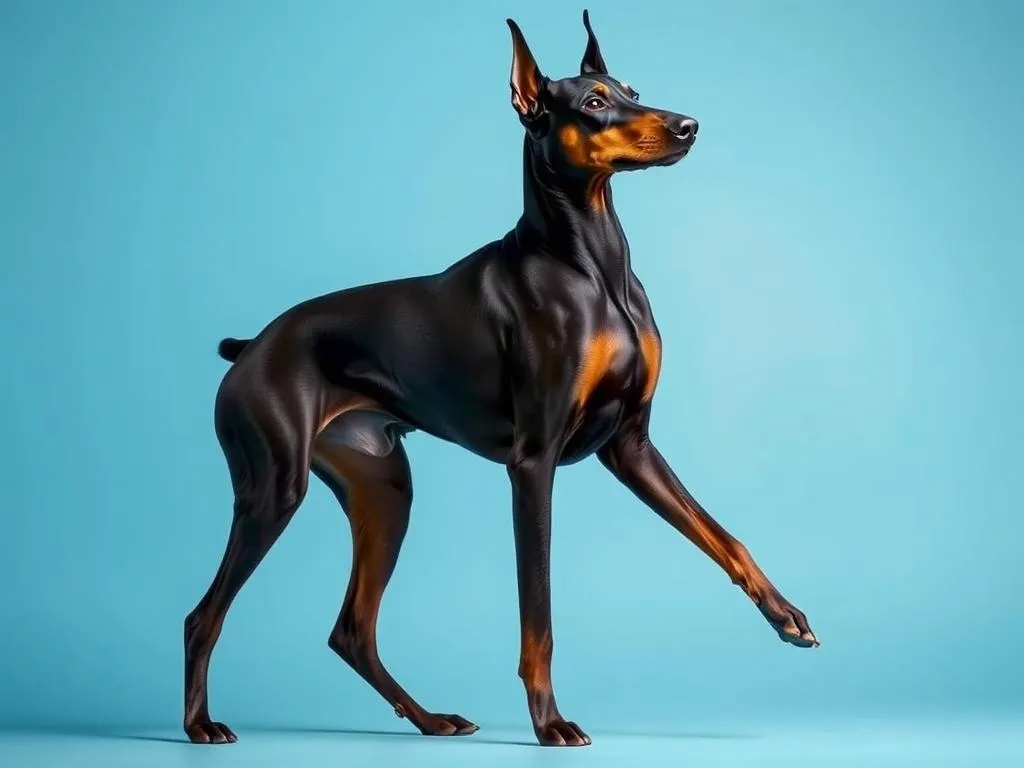
Introduction
Maintaining optimal health for our canine companions is essential, and dog health care plays a crucial role in ensuring they lead happy, active lives. One significant aspect of this care is maintaining a healthy weight. Just like humans, dogs can suffer from the consequences of being underweight, which can lead to various health issues and affect their overall quality of life.
Dobermans are a unique breed known for their loyalty, intelligence, and sleek appearance. However, they can be prone to certain health issues, particularly when it comes to weight management. Understanding the reasons why your Doberman is skinny is vital for dog owners to ensure these wonderful pets thrive.
This article aims to educate Doberman owners about the potential reasons behind their dog’s underweight condition and provide actionable tips for improving their health.
Understanding Doberman’s Ideal Weight
Standard Weight Range for Dobermans
For a healthy Doberman, the average weight ranges from 60 to 100 pounds, depending on their sex and age. Males typically weigh between 75 and 100 pounds, while females usually range from 60 to 90 pounds. Factors influencing their ideal weight include their age, activity level, and genetics.
Physical Characteristics of a Healthy Doberman
A well-nourished Doberman should have a streamlined body shape with defined muscles. Their ribs should not be visible, but you should be able to feel them with light pressure. Signs of being underweight include a pronounced spine, visible hip bones, and a lack of muscle tone. Knowing how to distinguish between a healthy weight and underweight condition is crucial for Doberman owners.
Common Reasons Why Your Doberman is Skinny
Nutritional Deficiencies
One of the primary reasons why your Doberman is skinny may be due to nutritional deficiencies. Many owners unknowingly make dietary mistakes that can lead to inadequate nutrition.
Inadequate Diet
A balanced diet is essential for a Doberman’s health. Common dietary mistakes include feeding low-quality dog food or not providing enough calories to meet their energy needs. A balanced nutrition plan should consist of high-quality proteins, healthy fats, and carbohydrates.
Quality of Dog Food
The quality of dog food plays a significant role in your Doberman’s weight. Commercial dog food varies greatly in quality. While some brands offer nutrient-rich formulas, others may contain fillers that provide little nutritional value. Homemade diets can also be beneficial if well-planned. Key nutrients for Dobermans include proteins for muscle growth, fats for energy, and carbohydrates for overall health.
Medical Conditions
Another significant factor contributing to a skinny Doberman could be underlying medical conditions.
Underlying Health Issues
Various health issues can lead to weight loss in dogs, including diabetes and thyroid problems. If your Doberman is losing weight despite a good appetite, it may be time to investigate potential medical concerns. Signs to watch for include lethargy, excessive thirst, or changes in behavior.
Parasites and Infections
Parasites such as worms can also cause significant weight loss in dogs. Symptoms of parasitic infections include diarrhea, vomiting, or a bloated abdomen. Regular vet check-ups and parasite screenings are essential to keep your Doberman healthy.
Stress and Anxiety
Emotional factors can have a profound impact on a dog’s eating habits.
Emotional Factors Affecting Weight
Stress and anxiety can lead to decreased appetite in dogs. A Doberman under stress might not eat properly, leading to weight loss. Signs of anxiety can include excessive barking, destructive behavior, or changes in sleeping patterns.
Environmental Changes
Changes in the environment, such as moving to a new home or the introduction of new pets, can also affect your dog’s eating habits. It’s important to monitor your Doberman’s behavior during these transitions and ensure they feel secure in their surroundings.
Age and Activity Level
The age and activity level of your Doberman are crucial factors in determining their weight.
Puppies and Growth
Growing Doberman puppies have unique nutritional needs that differ from adults. They require higher caloric intake to support their rapid growth. It’s essential to have a feeding schedule that accommodates their growth spurts and ensures they receive ample nutrients.
Active Adults vs. Sedentary Lifestyle
Adult Dobermans that are highly active may require more calories than those with a sedentary lifestyle. A balanced exercise regimen is vital for maintaining their weight. It’s important to find a healthy balance between activity and nutrition to prevent weight loss.
Assessing Your Doberman’s Weight
How to Properly Weigh Your Dog
Weighing your Doberman regularly is crucial for monitoring their health. To weigh your dog, follow these steps:
- Use a scale: A pet scale is ideal, but a regular scale can work as well.
- Weigh yourself first: Step on the scale and note your weight.
- Weigh yourself with your dog: Hold your Doberman and weigh yourself again.
- Calculate the difference: Subtract your weight from the total to determine your Doberman’s weight.
Understanding body condition scoring (BCS) can also help assess whether your Doberman is underweight. A scoring system from 1 to 9 can help you evaluate their body fat and provide a clearer picture of their health.
When to Seek Veterinary Help
If you notice significant weight loss or other concerning symptoms, it’s essential to consult a veterinarian. Signs that indicate the need for veterinary attention include severe lethargy, persistent vomiting, diarrhea, or any changes in behavior. Regular health check-ups can help catch potential issues early and ensure your Doberman remains healthy.
Tips for Helping Your Doberman Gain Weight
Nutritional Adjustments
Making strategic changes to your Doberman’s diet can help them gain weight effectively.
Choosing the Right Dog Food
Selecting high-calorie, nutrient-rich foods is essential for helping your Doberman gain weight. Look for dog foods specifically formulated for weight gain or those high in protein and healthy fats. Gradual changes to their diet can prevent gastrointestinal upset, so introduce new foods slowly.
Feeding Strategies
Increasing meal frequency can also be beneficial. Instead of two large meals a day, consider offering smaller, more frequent meals to encourage eating. Additionally, adding high-calorie snacks or supplements can provide extra calories to help your Doberman gain weight.
Regular Veterinary Check-ups
Monitoring your dog’s health through regular vet visits is crucial. Depending on your Doberman’s age and health status, your veterinarian may recommend check-ups every six months to a year. Keeping track of weight changes during these visits can help you identify any underlying issues early.
Exercise Regimen
Creating a balanced exercise plan is essential for a healthy weight gain process.
Creating a Balanced Exercise Plan
While it’s important for Dobermans to remain active, over-exercising can be counterproductive if they are trying to gain weight. Focus on fun, low-impact activities such as leisurely walks or gentle playtime. Tailoring your exercise regimen to your dog’s needs will ensure they remain healthy without losing weight.
Conclusion
In summary, numerous factors can contribute to the reasons why your Doberman is skinny. Nutritional deficiencies, medical conditions, stress, and activity levels all play a role in your dog’s weight. By understanding these factors and taking proactive steps to improve your Doberman’s health, you can help them achieve a healthy weight.
It’s crucial to be vigilant and proactive in your dog health care routine. Regular weigh-ins, veterinary visits, and attention to diet can make all the difference in your Doberman’s well-being.
Encouragement to Take Action
Taking action is essential for your dog’s health. By implementing the tips provided in this article, you can ensure that your Doberman remains happy, healthy, and at a healthy weight. Educating yourself about their nutritional and health needs is the first step toward a better quality of life for your beloved pet.









